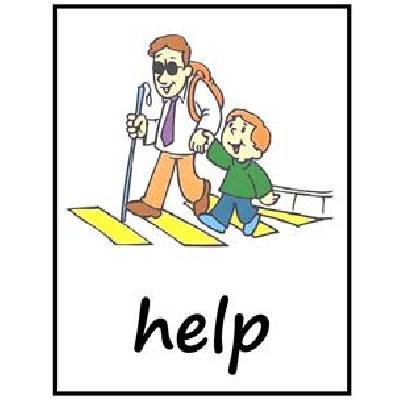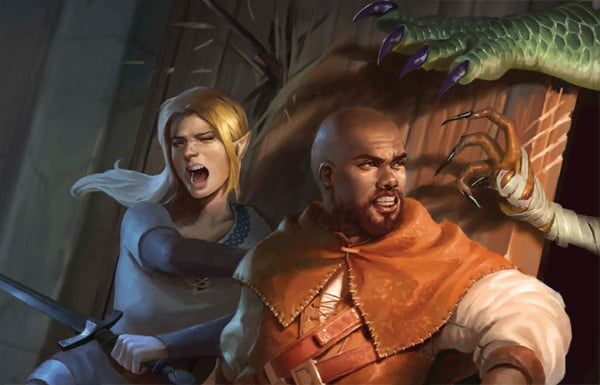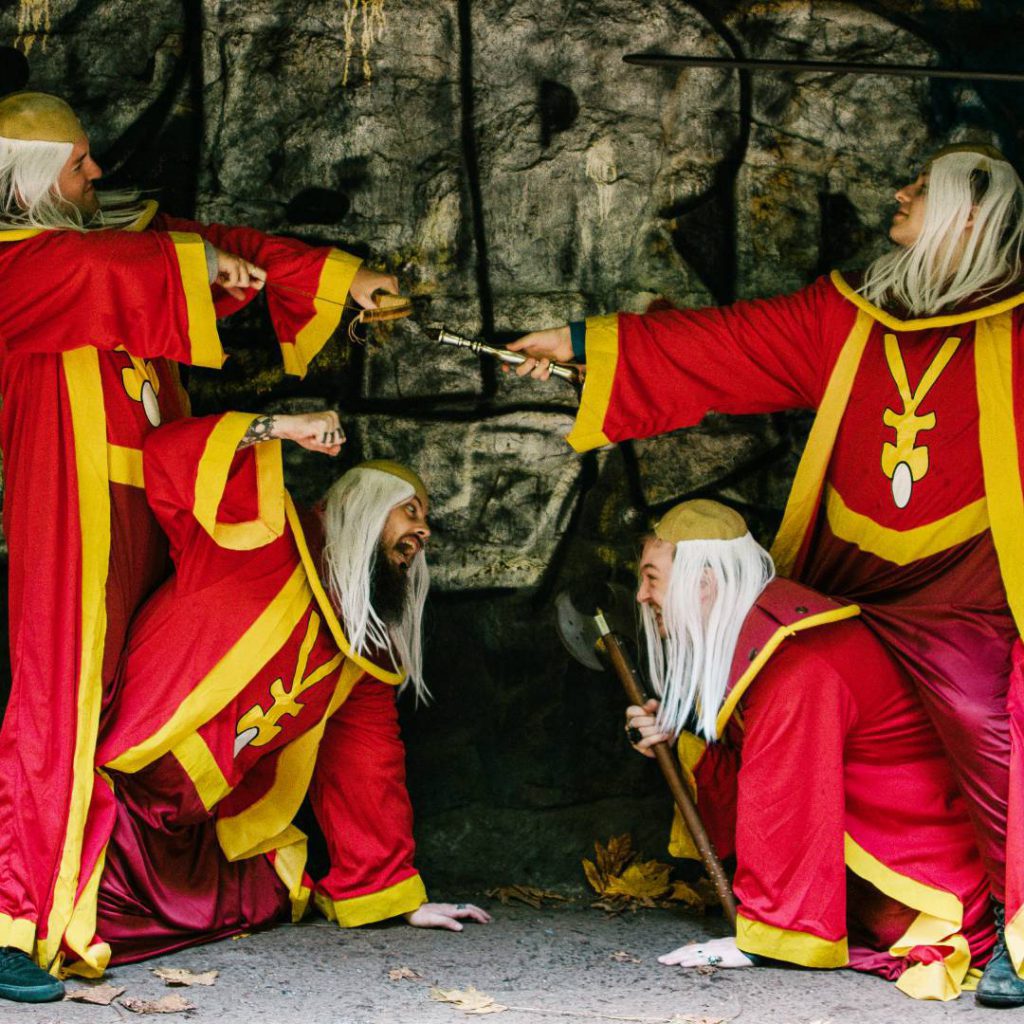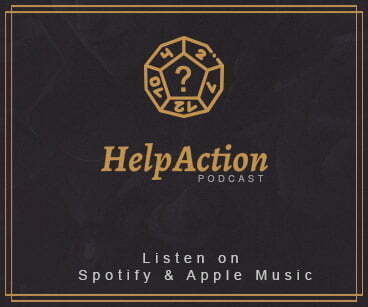What is the “Help” action? It may not be the first action that most would choose to explain to new players and it isn’t just the name of the website you find yourself reading from now, nor is it just the name of the podcast that started this all. It is also a very useful, very helpful action you can use while playing Dungeons & Dragons. It’s an action that can easily go under utilized, but once your players get used to using it, they will try to use it for every little thing they do outside of combat. It can go from underwhelming, to irritating if not kept in check by the Dungeon Master. What does it do? Let’s take a look.

Table of Contents
What Is The Help Action?
Before we get too far into this lets take a look at what the help action is in the rulebook. Below is the explanation of it as written on page 192 of the D&D Player’s Handbook.
“You can lend your aid to another creature in the completion of a task. When you take the Help action, the creature you aid gains advantage on the next ability check it makes to perform the task you are helping with, provided that it makes the check before the start of your next turn.
Alternatively, you can aid a friendly creature in attacking a creature within 5 feet of you. You feint, distract the target, or in some other way team up to make your ally’s attack more effective. If your ally attacks the target before your next turn, the first attack roll is made with advantage.”
In short, you may use your action on your turn to grant an ally advantage on an ability check, or attack roll, by helping them with it. Overall it’s a pretty simple concept and can be quite useful, you sacrifice your turn to give someone a better chance of completing something that needs to be done. Players can get creative with the ways they try to assist each other with different kinds of tasks, and as the DM, you get to decide if the help would be effective and allow the advantage.
How To Use The Help Action In D&D
Once players start to think about it they will realize that they can use the Help action in a wide range of situations. The uses can vary greatly from helping convince a guard to allow you passage or to assisting someone with tying the guard up after your cover is blown. Is there a heavy object blocking your party’s path but the barbarian wasn’t able to move it alone? You can use the Help action to give them a hand and grant them advantage on their next attempt! Is the rogue having a tough time finding any clues in a suspicious area? Help them take a look around.
Using The Help Action In Combat
In combat situations the use of this action is simple. A player can spend their action to Help another player attack a creature. Once the action is used, the character they are helping will have advantage on their next attack roll against the creature they were helping them attack. During combat encounters this is pretty straightforward. One player uses it on their turn, another one gets the benefit from it when it becomes their turn. The thing that you must keep in mind is that both you and the character you are helping must be within 5 feet of the creature you are helping them attack. You can’t try to help someone from a distance and you can’t try to distract someone while you wait for someone to run in. Both of you must already be in position, and though it isn’t stated in the ruling that is written, could depend on the enemy maintaining their position within 5 feet of the two of you. Who knows, if they move before your friend gets a chance to make their attack roll, the benefit may not be available anymore. That is up to the DM.
The Help action isn’t just limited to helping your friends with their attacks though! The first part of the Help action can still be used to grant others advantage on ability checks in combat as well. Are you in a heated battle with someone your group would like to question afterwards or keep from getting away? A player can use the Help action to assist a friend in trying to grapple an enemy so they can’t run away, or even Help with trying to disarm them or tying them up. Players can get creative with ways to help each other out, and not just in combat.

Using The Help Action In Roleplaying
Outside of combat encounters, players will find themselves in all sorts of situations that will depend on working together and helping each other out as a team. The Help action can be very useful outside of combat scenarios and players are much more inclined to use it when it doesn’t involve them not getting to do something cool on their turn that they have to wait around for. Whether exploring or interacting with npc’s there will always be a chance for players to make use of this action.
You can use a rope to help someone scale a wall, add a good point to the conversation to get you more money for your group’s reward, or maybe you just want to help the druid track down a new pet so they will shut up about it. Players can get just as creative, if not more so, in helping each other through roleplaying situations as they do in combat. Creativity in these situations should be encouraged, and hopefully rewarded, when it is applicable. However, it is necessary things are done within reason, and it is the DM’s job to make sure that those lines are drawn and adhered to.
Abusing The Help Action
This isn’t something that happens with every player and/or group but it is something, in my own personal experience, that can become a problem with some. It’s not really ever an issue during combat encounters because people are generally too wrapped up in figuring out which of their kick ass abilities they are going to use on their turn to even remember the help action exists. The abuse of the Help action will almost always happen in roleplaying situations because a player and/or group have realized they are just going to help each other with every little thing they do so they can try to have advantage on every single check they make. Let’s face it, that’s lame and it’s not fun. Some players, especially new ones, may not even realize they are doing it and are thinking they have just realized how to actually use the Help action. Not everyone over uses it but there are ways to keep it in check if you notice a group and/or player who is starting to do so.
In general players will use the action as they see fit and, as long as it’s reasonable, you give them the advantage for it. If you notice someone beginning to overdo it, the first thing you should do is talk to your players and set your expectations for the action and how it is used at your table. If it does become an issue, you can help prevent that by putting a simple rule in place to help mitigate overuse. A simple one that I use is that you may only offer someone the Help action if you are proficient in the skill needed to offer them assistance. This keeps the usually low-strength wizard from assisting the barbarian with pushing a boulder from the entrance of a cave as they are not normally proficient in the Athletics skill. It would also generally keep anyone from assisting the wizard with researching old spells unless they are proficient in the Arcana skill. That should normally solve the issue, but if it seems to come up more than you would like it is possible you could take it a step further and put a limit on the number of times the help action is used per short or long rest. Hopefully it doesn’t come to that.
Help Action In Other Games
As we’ve seen the Help action can be very useful in a wide range of situations both in and out of combat. As we all know, D&D isn’t the only ttrpg out there, and believe it or not, they aren’t the only ones that have a Help action. Not everyone calls it help, and it’s not always an action, but plenty of other games have some form of this mechanic built into their system.

Help Action In Pathfinder 2E
Pathfinder has long been a direct competitor with D&D and their latest edition of the game uses their ‘Aid Another’ action to allow players to give each other a helping hand. If I understand it correctly, Aid Another is actually a reaction that is used when an ally is about to make a roll that involves an ability check or an attack, and it must be prepared ahead of time by getting ready to “help” as an action on your turn. Instead of granting your friends advantage you make your own check that has a DC set by the GM and, if successful, will grant a +2 bonus to your friend’s check. The bonus can increase depending on how trained in the skill you are and can even become a -1 bonus if you critically fail the check.

Help Action In Star Wars RPG
In this ttrpg system from Fantasy Flight Games players trained in similar skills can offer assistance to other players and grant them additional ‘boost’ dice to roll with their checks. Characters with equal or greater skill can take an action to aid another character who is using a skill to perform a task by granting them a blue die, or ‘boost’ die.

Help Action In Warhammer RPG
This system adapted from the popular tabletop miniatures game has its own version, also called the Help action. Their version doesn’t grant other players advantage but instead does something like the Star Wars system mentioned above. You can use a Skill or Attribute to help someone else succeed on a Test. Say what you are doing to Help and what Attribute or Skill you are using. If the GM agrees that would be helpful, you get to give the player an additional number of dice to roll with their check equal to your rating in the skill.

Help Action The Podcast
Finally, Help Action is the reason this article exists at all. Our podcast, the show that started this all, took our name from this simple, yet often underused action with one thing in mind, to help you play better D&D. In this great big game called life we spend our turn taking the Help action and use our expertise to give you advantage on your roleplaying experiences. As cheesy as it sounds, that’s all we want to do. Through the articles you read here on our site or the shows we make for you to listen to, it is all because we want to help you learn and have as much fun as possible at the table. Knowing the rules is important but it’s not the most important part. We want to help everyone learn the game effectively so you can get past learning the rules easily and focus on having fun and telling stories.
On the show, Matt, Ethan, Max and myself share with you our experiences as Dungeon Masters and discuss the ins and outs of running games. We answer questions that are submitted by our listeners in addition to discussing a wide range of topics, including new and available products, in the hopes of helping you have better games. The show is geared towards offering advice to DMs but everything is discussed with their relationship to their players in mind. We all play the game together! If you haven’t given us a listen you should do so. You can check out the show page by clicking here. New episodes are available every other Friday and we would love to answer your questions.
Wrap Up
Now you know what the Help action is. A nifty little action that you can use to help out friends in game. Give them a hand, give them advantage. It’s nifty enough that it’s used in many other games as well. Players, get creative with it. DMs, don’t let them get carried away with it. Now that you know what to do with it, use it. And don’t forget to use it in your own life as well, everyone needs a little help sometimes.
